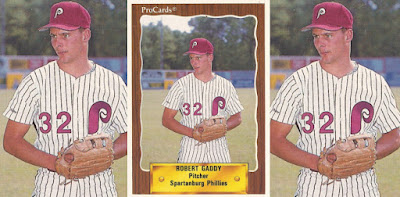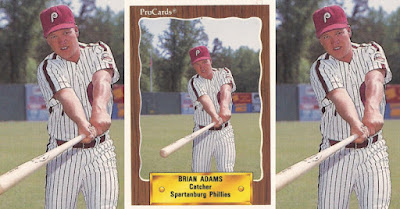Read the story behind this post

It was the day after Christmas 1986 and
Kelly Paris was driving. Soon, he was driving into a ravine, admitting later he'd been drinking prior to the accident,
according to The Los Angeles Times.
It was an accident that nearly cost Paris his life,
according to The Times. It was also an accident that he thanked God happened, and that he survived to learn from it.
"I've made a lot of changes in my life," Paris
told The Times in August 1988. "I realized for one I'm an alcoholic and that I had to cut that out of my life."
Paris
spoke to The Times on the occasion of his return to the major leagues, his first return since that 1986 accident.
Before the accident, Paris had seen time in
four major league campaigns, 78 total games. He hadn't hit a major league home run. During his 1988 return, though, Paris played in just 14 total games. He also hit his only three home runs.
Paris' career began back in 1975,
taken by the Cardinals in the second round of the draft, out of Taft High School in Woodland Hills, Ca.
He started in the rookie Gulf Coast League,
making single-A St. Petersburg in 1977. He first saw AA Arkansas in 1980, then AAA Springfield in 1981.
In September 1982, is eighth season as a pro, Paris made his debut in the majors, in St. Louis. With the Cardinals, Paris got into 12 games,
picking up three hits in 29 at bats.
He then returned to the majors in 1983, with the Reds, sent there in a trade. He ended up getting into 56 games for Cincinnati that year, hitting .250. After a year back in the minors in 1984, Paris picked up
five games each in 1985 and 1986 with the Orioles.
Then came Paris' accident
the day after Christmas 1986. The resulting injuries left him out of baseball for all of 1987. Paris returned to the field for 1988, signing with the White Sox and
playing at AAA Vancouver. He hit .284 in 89 games there. It was enough
to earn
his last trip to the majors that August.
The accident, the near-death experience, also changed his outlook on life, he
told The Chicago Tribune upon his return to the majors.
"Now I wake up every morning sober and can smell the roses," Paris
told The Tribune. "I got a new
lease on life, and now I've got a new lease on baseball."
Paris' lease, though, was a short one, with
an injury on the field, a broken elbow suffered in a collision, ending it and his major league career.
Paris
worked to get back, but ended up
playing two more seasons in the minors, ending his career for good.
Paris went on to serve as a coach for some American Legion teams, as well as an assistant coach with a high school. In 1994, he was named
head coach for Montclair Prep in California.
In March 1995, as Paris steered clear of that spring's troubles, Paris received
praise for his work as both a coach and instructor.
"Kelly is an excellent instructor, not so much because he played major
league baseball but because he genuinely likes kids and they like him," Mike Dow, an official at the complex where Paris served as an instructor,
told The Times. "He has built his business through
hard work and it has been a great boost to our program."























